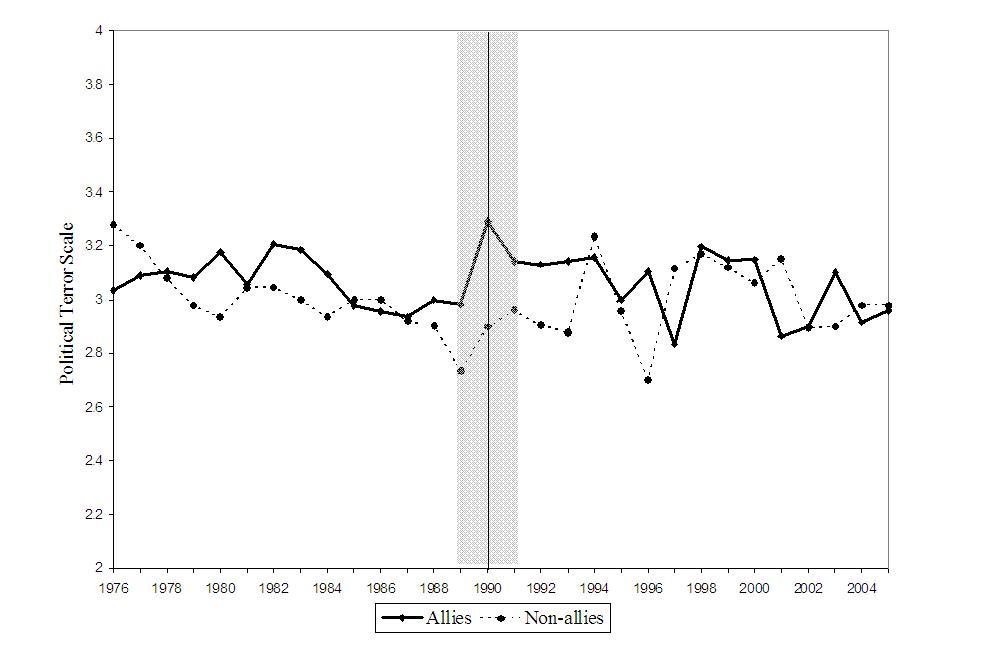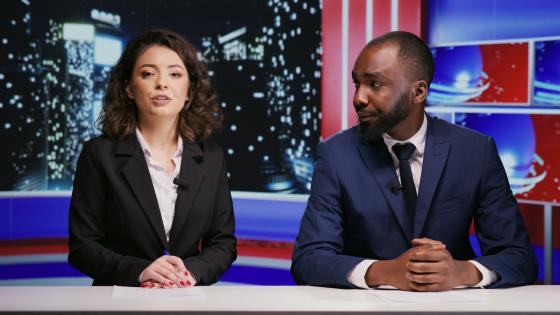It is not uncommon for governments to justify their political and economic policies with the human rights situations in the countries they deal with. For example, in June, 2008, US Commerce Secretary Carlos Gutierrez explained that the US must continue its trade embargo on Cuba because the latter "systematically brutalizes its people".1 Using human rights as a determinant of private investment and economic policy is not, prima facie, a cause for particular concern. However, critics of the US State Department have complained that it unfairly biases its human rights reports against countries that have opposing ideologies and favours countries that are strategically valuable to the US (Poe, Carey and Vasquez, 2001).2
A recent study by Qian and Yanagizawa (2008a) finds that the US State Department systematically favoured its allies during the Cold War by under-reporting human rights violations. Hence, they infer a change in the otherwise unobservable strategic value of a country to the US by comparing reports of human rights violations from the US relative to reports from Amnesty International for US allies and non-allies before and after the Cold War ended. A well known example of this is Zaire (renamed the Democratic Republic of Congo in 1997). Its president, Mobutu Sese Seko (in office 1965-1997) was a strong supporter of the US during the Cold War. During a state visit to the US in 1983, US president Ronald Reagan praised Mobutu and said in response to the international criticism of Mobutu's human rights abuses that he was a "voice of good sense and good will". Immediately after the Cold War ended, the State Department began to criticize Zaire's human rights violations. And in 1993, Mobutu was denied a visa for visiting the US. He remarked at that time "I am the latest victim of the Cold War, no longer needed by the US. The lesson is that my support for American policy [now] counts for nothing" (Gbadolite, 2001).
Qian and Yanagizawa (2008a) measure alliance as the fraction of votes in agreement with the US on issues that were divided between the US and USSR at the United Nations General Assembly. Then, they compare US reports to Amnesty International’s before and after the Cold War for countries that were allied and not allied to the US. Figure 1A shows that Amnesty reported on US allies and non-allies similarly, with little change over time.
Figure 1A: Amnesty human rights reports for US allies and non-allies
The next figure, Figure 1B, shows that the US State Department systematically reported fewer violations for their allies during the Cold War. However, this favouritism disappears afterwards.
Figure 1B: US human rights reports for US allies and non-allies
How much do these distorted reports affect policy?
On the one hand, there should be a significant effect. US policy is determined by democratically elected representatives whose choices should broadly reflect their constituents’ preferences. Empirical evidence suggests that Americans value good human rights situations in their trading partners and allies.3 Then this distortion in human rights reports by the US State Department could have serious political and economic consequences if it is conveyed to voters. This concern is supported by several recent studies. Stromberg (2004) found that the media affected spending on relief aid. Other studies have found that the media can affect political behaviour such as voting, participation in local governance, and ethnic tensions (Gentzkow, 2006; Chang and Knight, 2008; Della Vigna and Kaplan, 2007; Olken, 2008; and Paluck, 2008).
On the other hand, whether any supplier of primary information is able to distort a competitive media market such as the US is an open question. The ability of the free press to diminish distortions from primary sources is implicitly assumed by standard political theory and journalists in the US,(Prat and Stromberg, 2005; Besley and Prat, 2006; Gentzkow, Glaeser and Goldin, 2006).
However, a news organization ability to obtain the truth depends on its access to independent information. In the best of worlds, the relative meagre resources of media firms relative to the government, who has embassies and stable intelligence personnel in almost every country, means that the government will probably always be an important primary source of information for international news. Foreign bureaus with permanent foreign correspondents that are knowledgeable in local customs, languages, and have good local connections are financially costly. Constable (2007) reports that a bureau costs approximately $250,000 per year on average, and can be as expensive as $1 million per year. For small metropolitan newspapers, the cost is prohibitive. Larger newspapers may be able to afford foreign bureaus but still need to consider the relative benefits of spending resources on foreign correspondents relative to other news coverage (e.g. sports, entertainment, domestic news) which are both presumably much less expensive to cover and more popular for readers (with the exception of large foreign events). In 2008, the New York Times Corporations’ advertising revenues from reporting foreign news that year was less than 3.5% compared to 49% from reporting domestic news.4
It is not surprising to find out that most American news organizations have drastically reduced the number of foreign correspondents in the recent two decades so that only four newspapers have stable foreign offices today. In 2007, all US newspapers combined had only 141 foreign correspondents. Notable newspapers such as the Boston Globe and the Baltimore Sun have recently closed their last foreign offices. And even after 9/11 and the beginning of the Iraq War, when Americans' demand for information about relatively unknown foreign countries were presumably at a peak, the number of foreign correspondents working for newspapers continued to decrease from 188 in 2002 to 141 in 2007 (Caroll, 2007). The number of television networks with foreign offices has also decreased, from fifteen during the 1980s to six in 2007 (Constable, 2007).
As a substitute, news organizations have increasingly resorted to picking up stories from newswires, pack journalism, where all media firms rely on a single source, and parachute journalism, where reporters without much pre-existing knowledge or connections of a region are dropped in to report breaking news.5Veteran news reporters and media executives worry that while freelancers and newswire agencies can cover the occurrence of events, they may lack the background necessary to give in-depth reports or accurate interpretations of facts.
Using freelancers also poses the disadvantage that it is often difficult to travel to locations in sudden crisis. The news will have to come from newswires if they happen to have correspondents in place, be delivered late when reporters can be sent into the scene, or come from potentially biased government sources. For example, during the Rwandese Genocide in 1994, only two of the 54 articles published by the New York Times during the first thirty days were written from Rwanda.In 1964, the year before the US first deployed troops to Vietnam, 40% of the 1,463 New York Times articles on Vietnam were written from Vietnam. In contrast, during the twelve months before the invasion of Iraq on March 20, 2003, only 9% of the 1,611 New York Times articles on Iraq were written from Iraq (Qian and Yanagizawa, 2008b).
Adding to this concern is the possibility that even if the media were informed of the distortions in the government’s reports, it would knowingly allow its own coverage to be distorted. Qian and Yanagizawa (2008b) study the effect US State Department bias in human rights reports on coverage in the New York Times. They find that under-reporting from the State Department significantly reduces coverage of abuses.. Furthermore, the effect is equally large for countries where media has free access as for countries where media access is restricted. This latter result suggests that the distortion in media coverage is not driven by the New York Times’ inability to obtain the truth. Rather, as a profit making firm, it is probably just minimizing its costs and it is less costly to obtain information from the State Department than from other sources.
There seems to be much reason to doubt the ability of the Fourth Estate to mitigate government bias and provide the American public with accurate news. The problem resides both in the government’s manipulation of information and in the incentives of news organizations that knowingly allow their coverage to be distorted. Regarding the latter, Walter Cronkite described the concerns of many Americans when he said in a speech at Columbia University in January, 2007: "The need for high-quality reporting is greater than ever. It's not just the journalist's job at risk here. It's American democracy."
Footnotes
1 Letters to the Editor, Washington Post, Monday, June 9, 2008; Page A16.
2 Also see Stohl and Carleton (1985), and Mitchell and McCormick (1988).
3 Blanton and Blanton (2007) show that US Foreign Direct Investment is negatively correlated with human rights violations.
4 See financial report of monthly revenues in 2008 for investors of the New York Times Company.
5 The term pack journalism was coined by Timothy Crouse in his book The Boys on the Bus (1973), a standard text for university journalism courses, which critically discussed the press coverage of the 1972 presidential campaigns. It refers to the informal consensus that forms when reporters reply on each other or are dependent on a single source for information. For a detailed discussion of parachute journalism in the US today, see Erickson (2006).
References
Blanton, Shannon Lindsey and Robert C. Blanton. "What Attracts Foreign Investors? An Examination of Human Rights and Foreign Direct Investment," The Journal of Politics 69(1): 143-55 (2007).
Chang, Chun-Fang and Knight, Brian (2008) "Media Bias and Influence: Evidence from Newspaper Endorsements", NBER Working Paper 14445 .
Constable, Pamela "The Demise of the Foreign Correspondent", Washington Post, Sunday, February 18, 2007; B01.
Crouse, Timothy. (1974) The Boys on the Bus. Ballantine Books.
Della Vigna, Stefano and Kaplan, Ethan (2007) "The Fox News Effect: Media Bias and Voting" Quarterly Journal of Economics.
Gbadolite, Adam Zagorin. "Leaving Fire in His Wake" TIME Magazine, Sunday, Jun. 24, 2001.
Gentzkow, Mathew. (2006) "Television and Voter Turnout" Quarterly Journal of Economics, CXXI (3).
Gentzkow, Matthew, Edward L. Glaeser, and Claudia D. Goldin (2006) "The Rise of the Fourth Estate: How Newspapers Became Informative and Why It Mattered." NBER Working Paper 10791.
Olken, Benjamin (2008) "Do TV and Radio Destroy Social Capital? Evidence from Indonesian Villages", MIT Working Paper.
Paluck, Elizabeth (2008) "Reducing intergroup prejudice and conflict using the media: A field experiment in Rwanda", Journal of Personality and Social Psychology, Forthcoming.
Poe, Steven C., Sabine C. Carey and Tanya C. Vasquez (2001) "How are these pictures different? A quantitative comparison of the U.S. State Department and Amnesty International Human Rights Reports, 1976-95", Human Rights Quarterly 23, pp 650-77.
Prat, Andrea and Stromberg, David (2005) "Commercial Television and Voter Information." CEPR Discussion Papers 4989.
Qian, Nancy and Yanagizawa, David (2008a) "The Strategic Determinants of U.S. Human Rights Reporting: Evidence from the Cold War" Journal of European Economic Association Papers and Proceedings, Forthcoming.
Qian, Nancy and Yanagizawa, David (2008b) “The Power of Propaganda: The Effect of U.S. Government Bias on Media Coverage of Human Rights during the Cold War” Brown University Working Paper.
Stohl, Michael and Carleton, David (1985) "Foreign Policy of Human Rights: Rhetoric and Reality from Jimmy Carter to Ronald Reagan”, Human Rights Quarterly 7, p 205-29.
Stromberg, David (2002) "Mass Media Competition, Political Competition, and Public Policy" Stockholm University Working Paper.
Stromberg, David (2004) "Radio's Impact on Public Spending", Quarterly Journal of Economics, 119(1).



